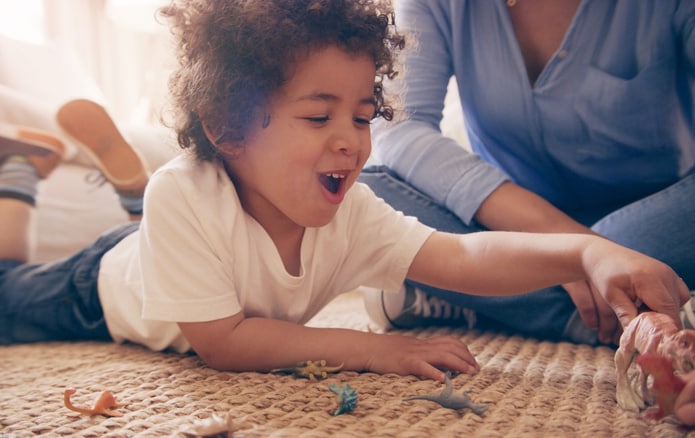It feels like the term “neurodivergence” is everywhere these days, but it’s rare we get a helpful breakdown of what it is and what it means for our children. Research suggests 15 to 20% of the population is neurodivergent. While there’s no singular experience for neurodivergent children, Laura Petix, a pediatric occupational therapist, mom to a neurodivergent daughter and the author of “A Kids Book About Neurodiversity,” says parents may see evidence in behavior.
“If you notice your child learns differently than their peers, communicates in a certain way (or lacks communication abilities), maybe has extreme emotions or extreme or different ways of displaying emotions, those may be some big clues that they have a differently wired brain,” she says.
Many parents wonder if they have a neurodivergent child and want to support them affirmingly. If you’re wondering how to identify neurodivergent kids and ensure they have the resources they need to thrive, read on to learn what neurodivergence is and how experts say you can best support your neurodivergent child.
What does neurodivergent mean?
“Neurodivergent” is an umbrella term that applies to many conditions. Maria Davis-Pierre, a licensed mental health counselor and the founder and CEO of Autism in Black Inc., says people often confuse the term “neurodiversity,” which includes everybody and how we all think differently, with “neurodivergence,” which describes those who have a diagnosis that makes their brains work differently.
The manifestation of neurodivergent brain differences varies, but often it involves differences in executive functioning, the control panel of the brain, which helps us focus and sustain attention, plan, organize and regulate emotions. The term “neurodivergent” can include diagnoses like Attention Deficit Hyperactive Disorder (ADHD) and autism, as well as:
- Anxiety.
- Obsessive Compulsive Disorder (OCD).
- Synesthesia.
- Tourette’s Syndrome.
- Learning differences, like dyslexia and dyscalculia.
- Bipolar disorder.
- Down syndrome.
“[Neurodivergence] comes with a variety of traits, signs, strengths and challenges,” says Petix. “At the heart of it, a child being neurodivergent means that their brain processes information, communicates, learns and plays differently than the majority of kids their age. Not necessarily worse than, but just different.”
Are gifted kids neurodivergent?
Does being gifted mean your child is neurodivergent? Not necessarily. Gifted children may have neurological differences that shape how they process and interact with the world, but giftedness or “genius” labels are based on IQ and non-traditional thinking, rather than specific behaviors associated with neurodivergence.
A gifted child may also be neurodivergent, and those who are neurodivergent but are still doing well in school can be vulnerable to sliding under the radar and missing needed individualized support. Pay close attention to your child, experts advise, and regularly ask them what things feel good about school and what things feel challenging. Parent the child you have, and offer them support based on their unique circumstances.
How can you tell if your child is neurodivergent?
Anything that differs from “typical” or “normative” behavior and brings differences in how your brain processes information can be neurodivergent, says Dr. Ayesha Cheema-Hasan, a developmental pediatrician, mom of four and the founder of Coralis Health. No two neurodivergent people are the same, and parents are best prepared to know if their child needs support.
“If your gut tells you there’s a concern about your child’s development, reach out to your pediatrician. It’s not going to hurt your child if you get an answer to your question.”
— Dr. Ayesha Cheema-Hasan, developmental pediatrician
“Every child develops differently,” Cheema-Hasan adds. For example, whether a talkative child is exhibiting normal behavior or not depends on many components. If you have a concern about your child, she recommends asking yourself, “Is this affecting my child’s ability to function and inhibiting their progress socially, emotionally or academically?”
If it is, talk with your child’s doctor. A developmental behavioral pediatrician, psychologist or neurologist can also be a valuable resource. While there’s no single or definitive list of neurodivergent symptoms, neurodivergent kids may demonstrate that they need support with the following behaviors:
- Starting tasks or ending procrastination.
- Keeping up with classwork.
- Making friends.
- Coping with hyperactivity.
- Maintaining focus and attention.
- Following instructions.
- Managing stress and anxiety.
- Managing emotions, outbursts and frustration.
Cheema-Hasan discourages blanketly labeling behaviors as problematic, and instead recommends advocating for individualized support for each child. “If your gut tells you there’s a concern about your child’s development, reach out to your pediatrician,” she explains. “It’s not going to hurt your child if you get an answer to your question.” Either you’ll be notified of differences and get support so they can reach their potential, or you’ll be told that the child is following a normative curve, she adds.
It’s important to note that even though the representation of neurodivergent people is expanding, race and gender-based discrimination maintain structural barriers to accurate diagnosis and support, especially for Black and brown youth. Further, Black children, especially Black boys, are disproportionately labeled with conditions like emotional disturbance and are more likely to be removed from school or restrained by police.
It’s unfair that families of color have to deal with discrimination and discomfort while seeking care, but experts say there are a few options. Parents can:
- Use virtual support networks to find compassionate providers.
- Check reviews for providers before seeking care.
- Invite a trusted medical support person to attend meetings to ensure your concerns are met.
- Report discriminatory providers.
“It’s OK to say, ‘I’m going to not talk to this provider anymore,’” Davis-Pierre says. “[Instead], I’m going to go over here and make an appointment with this person and then have all my stuff faxed over.”
How can parents support neurodivergent kids?
Some neurodivergent youth will need targeted support with social-emotional learning and school accommodations. Others might manage their differences with minimal intervention and a team of loved ones that helps them with the needed social, emotional and academic shifts. Families can work with educators and mental health professionals to determine the best level of support for each child. Here are some other ways experts say you can help neurodivergent kids thrive:
1. Adopt a neuro-affirming care model
Petix says neurodivergent kids will benefit from a neuro-affirming caregiving model. This includes:
- Accepting all kinds of brain-wiring.
- Meeting children where they are.
- Adapting your expectations based on your child’s skills.
- Using kids’ hyper-focused interests as tools to develop new skills.
“[Being neuro-affirming] means being open to accommodating the child’s needs rather than forcing them to accommodate a neurotypical world and experience,” Petix explains. An example would be, instead of wondering how to get a hyperactive 5-year-old to sit still at story time, we could think, “What sensory supports can I offer my 5-year-old so they can participate in library circle time?”
2. Stay up-to-date on resources and support
The most important research is talking to your child and asking them how they experience the world and what they need, experts say. Beyond this, parents have more resources than ever to embrace neurodiversity and neuro-affirming models. Some suggestions from the experts include:
- Familiarizing yourself with Individualized Education Plans (IEP) or 504 plans for in-school support.
- Learning from disabled-led resources, like Too Autistic for Black and Latinx perspectives.
- Committing to fighting neurodivergent stigma with initiatives like the “Be the Reason” campaign.
- Researching affirming and effective accommodations from sources like ADDitude Magazine.
3. Consider occupational therapy
There will be times when families need additional support to make sure neurodivergent children are getting what they need. In addition to working with pediatricians, therapists and other experts, Petix notes that occupational therapy can also aid families. Occupational therapists help identify and customize sensory regulation strategies and develop sensory diets — personalized plans of activities that help children meet their sensory needs — to find something that works for individual families.
“A pediatric occupational therapist trained in sensory integration approaches can help families with neurodivergent children understand their nervous system and dysregulated behaviors,” Petix says. “They can help decode behaviors into meaningful patterns of information so that we can support children more effectively and from a ‘bottom-up’ approach, which means supporting their body and brain (specifically, the nervous system) instead of just trying to address the outward behavior.”
4. Find and cultivate community
Davis-Pierre notes that families are better prepared to support their children and themselves when they have community. This is especially important for neurodivergent families of color. The following avenues can help parents cultivate community:
- Social media groups, like The Childhood Collective and Shawna Hughes ADHD Nutrition.
- Annual conferences, such as Autism and Black or Moments of Joy Fest.
- Local and online parent support groups.
It’s also an option to hire an advocate or medical support person to accompany you to meetings and appointments to ensure your child gets the right kind of support.
5. Avoid a deficit-based treatment approach
Historically, many health providers have employed deficit-based approaches when working with neurodivergent kids, Davis-Pierre says. These approaches treated neurodivergence as a problem to be solved, rather than offering positive and affirming support.
Davis-Pierre and Cheema-Hasan are clear that there is as much diversity between two neurodivergent individuals as there is between a neurodivergent and a neurotypical individual. Every child is different. The best approach to supporting your neurodivergent child is getting to know and accept them as an individual and affirming their unique identities and interests. “I want parents to understand that there is no need to ‘fix’ your children,” Davis-Pierre says.






